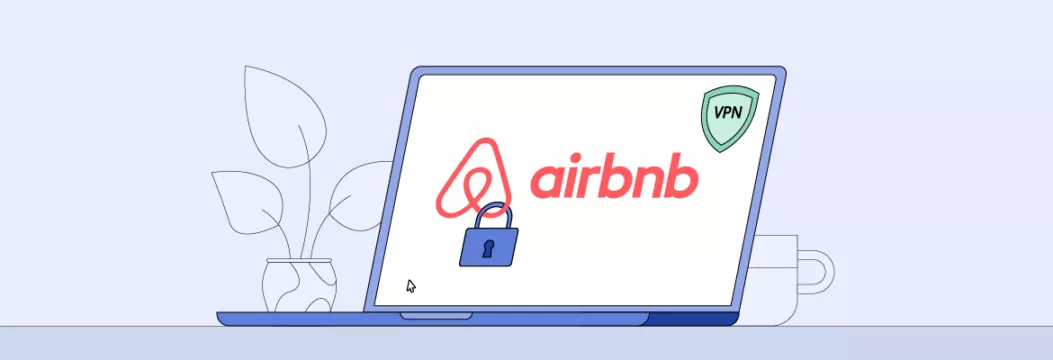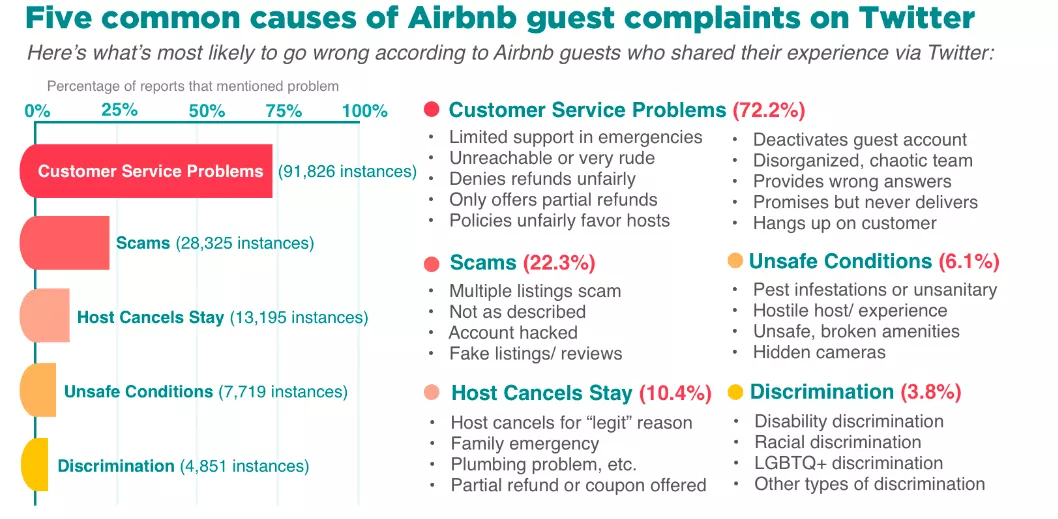Is Airbnb Safe? A Comprehensive Analysis of Safety Measures and Concerns
Airbnb has become one of the best platforms for modern globetrotters, offering over 7 million active listings in nearly 10,000 cities worldwide. This convenient service transformed the industry, providing numerous options for flexible, cost-effective, and unique accommodation experiences. But when planning your next adventure, it’s important to make sure that your rental won’t go wrong. And here comes the question: how safe is Airbnb? Read along to find out the most common risks associated with the service and learn how to safeguard yourself on your upcoming trip.

How safe is Airbnb? A quick answer
To cut a long story short, Airbnb is perfectly safe – or at least much safer than some small, niche platforms for homestays. To ensure this high protection level, the company implemented many decent features and cybersecurity measures to avoid fraud (more on that in a bit). After all, the popularity of Airbnb and the vast number of positive reviews speak for themselves.
Still, it doesn’t mean that Airbnb is completely secure. As with any other digital platform, it comes with certain risks and pitfalls. So, if you’re new to the platform, it’s a good idea to get to know the most common Airbnb security downsides and learn about some red flags to avoid with the help of powerful solutions like a virtual private network (VPN).
Now, let’s briefly overview the main protection measures Airbnb provides to safeguard users’ experience.
Airbnb security features overview
In 2021, a famous data scientist, Asher Fergusson, partnered with other researchers and came up with a detailed report containing the most common complaints Airbnb guests tweeted after their unhappy experience. Apart from unsatisfying customer support, users’ concerns included scams (such as fake listings, deceiving reviews, and hacked accounts), unpredicted cancellation of stays, unsafe conditions, and discrimination.

But let’s be fair – in the last two years, Airbnb has put much effort into improving its reputation and increasing the service’s security. To keep both guests and hosts safe, the platform ensures the following security precautions:
- Background checks. This verification is necessary to make sure that a guest or a host is trustworthy. In particular, the service looks for potential criminal record activity. When checking this information, Airbnb uses a person’s first name, last name, and date of birth.
- Identity verification. Airbnb verifies the identity of every user. Their personal details should be accurate, valid, and up-to-date. This measure helps prevent various types of fraud.
- Secure payment system. Airbnb offers a secure payment system that includes Payin for guests and Payout for hosts. A guest can use any convenient payment method, from credit or debit card to PayPal, to confirm the reservation. The host, in turn, receives funds 24 hours after the scheduled check-in.
- Protected messaging platform. Airbnb ensures that your messaging within the platform is secure and private. It even has a dedicated feature that detects and blocks suspicious messages containing spoofed links or contact info. The platform also claims not to share any of your private data with hosts and other third parties.
- Identification of fishy accounts. Airbnb uses a specific algorithm to identify and block suspicious accounts. Although some users say it often leads to unfair bans, it also may prevent fraudulent activity.
As you can see, Airbnb offers a vast number of features protecting users from scams. But with hundreds of social engineering tricks and techniques evolving every year, it’s still possible to get trapped. Here are the most widespread risks to watch out for when using Airbnb.
Most common Airbnb security risks
From fake listings and phishing scams to Wi-Fi threats and hidden cameras, here are the most typical Airbnb dangers – and, of course, ways to protect yourself.
Fake Airbnb listings
Malicious hosts can offer properties that either don’t exist or belong to someone else, while scammers include them in their Airbnb listings. When you contact the host, they will do their best to convince you to pay them for your stay outside of the legit Airbnb platform.
Here’s one example of a fake Airbnb listing a user posted on Twitter:
@AirbnbHelp i got msg from you guys that this is a fake profile, its up AGAIN #airbnbfail #scam #fake pic.twitter.com/nJJUAdx8In
— G (@HEREXVII) May 9, 2016
Airbnb uses advanced technologies like machine learning algorithms to detect fake listings and block malicious accounts, posting them on the platform. Still, it’s worth taking some extra security measures to stay away from such scams when using Airbnb.
How to avoid it? While being among the most common types of fraud, fake listing scams are fairly easy to prevent. The rule of thumb here is to avoid any contact with the host outside of Airbnb. If they request any payments beyond the platform, you’re likely dealing with scammers. Remember that your money is safe until you keep your communication with the host within Airbnb.
Deceiving descriptions
Airbnb requires hosts to publish actual and detailed property descriptions with real photos. Unfortunately, it sometimes happens that the description doesn’t correspond to reality.
Now, imagine you’ve picked a perfect place for your family vacation on Airbnb. In the photos, it looks clean, cozy, and kid-friendly. But when you arrive, it appears that the house you paid for doesn’t exist. The actual place is very different from what you expected – and most likely, not in a good way.
Here is one example of a deceiving Airbnb listing description:
“Progressive Jacuzzi Tub master and bedroom” ad from@Airbnb ($100/night)… actually was this (please compare with the real ad). Please do avoid scams supported by @Airbnb. @Airbnb_No_Thk @airbbnb_warning pic.twitter.com/k8109XY9Un
— AirbnbNoThanks (@airbnb_no) November 5, 2018
How to avoid it? When choosing a property on Airbnb, prioritize those with more than 100 positive reviews. Also, if the images in the description look suspicious, try checking their authenticity. You can enter the picture’s URL into the image search on Google to find where it comes from.
Pseudo-reviews
Guest reviews on Airbnb are among the main factors you may consider when picking a property among dozens of options available. The good news is that it’s much harder to publish a fake review on Airbnb than on other similar platforms. That’s because Airbnb only allows a user to leave a review for a listing when they have verified their identities and had at least one successful checkout.
And the bad news? As always, scammers find ways to hack the system. Some manage to generate positive reviews through fake accounts to raise the rating of their listings. Here’s an example of deceptive reviews about an Airbnb listing in Houston, TX, that eventually appeared to be a bait-and-switch scam:

How to avoid it? While reviews are a great way to verify if a particular Airbnb listing is suitable, they shouldn’t be the only factor you consider when booking a place. Also, don’t rely heavily on unquestionably excellent reviews left by recently registered users.
Phishing
When you get an email or a text message from Airbnb support, don’t rush to follow the instructions provided in it or click on any links it contains. Malicious actors often impersonate legitimate services like Airbnb, attempting to lure users in a phishing trap.
Usually, scammers use this scheme to steal credentials, taking you to a shady website through a spoofed link. They may try to deceive you using some common social engineering techniques. For instance, a fraudster may play with a sense of urgency. Airbnb email scams could try to convince you that your account will be blocked if you don’t verify your password or email immediately.
Remember that Airbnb validates your ID, asking for your personal details only within the platform. Any messages you receive externally can’t be trusted.
How to avoid it? Never respond to emails and messages you receive outside the Airbnb platform, even if they look legitimate. Also, avoid clicking on any provided links. Check the sender’s email address (you can find the full list of official Airbnb links and domains here). If anything looks suspicious, you can report the potential scam to Airbnb.

Bogus charges
In general, extra charges are a normal practice supported by most booking platforms, including Airbnb. As a guest, you may have to pay more money to the host after your checkout if you change your reservation (for instance, add more guests). Also, it’s possible that a host files a cover request for damage that occurred during your stay.
The problem is that some scammers may try to take advantage of this rule, requiring extra payment even if you didn’t cause any damage (in most cases, the place was already damaged before your arrival). Here is an example of a damage claim that doesn’t include any pictures to prove it.

How to avoid it? It’s worth taking pictures of the apartment both when you check in and check out. Also, instantly report the damage you notice upon your arrival. This will help you prove that you aren’t the one to blame. If you disagree with the host’s request for an extra charge, you can dispute it in the Airbnb Resolution Center.
Unprotected Wi-Fi threats
Good Wi-Fi is among the most important factors to consider when choosing a property to rent for your vacation or work trip. But have you ever wondered how safe the network in your booked Airbnb apartment is? The answer is pretty disappointing – as with any other public Wi-Fi, it comes with a significant risk to your digital privacy and security.
The main threats associated with public Wi-Fi spots include unprotected connections, malware distribution, cyberattacks, and stalking. Since such networks often lack some essential security measures, from strong passwords to data encryption, they are much more vulnerable than home Wi-Fi or mobile data. Moreover, the Wi-Fi owner can learn a lot about your browsing activities when you’re connected to their network, causing even more damage to your privacy.
How to avoid it? To protect yourself from Airbnb Wi-Fi risks, protect your connection with a reliable VPN. Also, it’s better to avoid conducting sensitive transactions and prioritize using mobile data. Find out more details on how to stay safe on hotel Wi-Fi here.
Hidden cameras
It’s not against Airbnb rules to use security cameras in common spaces, such as living rooms, hallways, kitchens, and so on. But if a host uses such a device, they must inform the guest about it beforehand. That said, a hidden camera in an Airbnb house is a major violation of the platform’s policy. Moreover, installing cameras in bathrooms, bedrooms, and spa areas is forbidden for property owners in most parts of the world.
But this doesn’t stop some hosts from using hidden cameras in their properties, using them for unlawful surveillance. It’s worth noting that such gadgets vary in size and shape. They can be installed into anything, from clocks and mirrors to shower gel bottles and tissue boxes.
How to avoid it? If you suspect that your Airbnb apartment has hidden cameras, look around. The most usual places where such devices can be found include outlets like phone charges and Wi-Fi routers. Also, they can be hidden in vents. If you detect one, immediately report the issue to Airbnb.
6 essential Airbnb safety tips
Wondering how to make your journey safer? We’re here to help! Check out our tips on how not to let Airbnb security issues ruin your holiday.
1. Check the description and reviews closely
If a certain Airbnb listing seems suitable, don’t rush to book it. First, carefully check the description of the place. Look for offers with positive feedback from other guests (the ones with over 100 reviews are mostly a safe bet) and feel free to ask the host your questions beforehand. Also, pay close attention to the number of photos provided in the listing. The more pictures included, the more likely you’re dealing with a legitimate accommodation offer.
2. Communicate within the platform
Always keep your communication with hosts inside the Airbnb platform. This way, your private details, including email and phone number, won’t be revealed. Also, it reduces the risk of getting trapped into a scam, as you can always rely on Airbnb support if something goes wrong.
3. Don’t make any payments outside of Airbnb
Similar to your chat with the host, any transactions should be conducted within the Airbnb app. Scammers may try to convince you to use another payment method to avoid security measures established by the platform. But once you do, your money will be at risk. Even if you’re not dealing with a fraudster, you won’t be able to resolve any potential disputes or disagreements with the host. Airbnb support only helps with challenges related to payments you make within the app.
4. Don’t trust suspicious emails
Airbnb support agents can only text you within the platform or through a valid email domain address, such as @airbnb.com, @airbnbmail.com, or @support-email.airbnb.com. Avoid responding to emails with an unverified sender. Also, never click on any links provided in such messages. Otherwise, you risk falling victim to an Airbnb email scam and exposing your private data to malicious actors.
5. Make a quick safety check upon arrival
Make sure to make some essential security checks right after your check-in. In particular, consider taking the following precautions:
- Verify if the apartment looks the same as it was presented in the Airbnb description. Check whether all the necessary equipment and furniture are in place.
- Look for any damage in your rented home and take pictures reflecting its current condition. Later on, it may help you protect yourself against unfair requests to cover the damage you haven’t caused.
- Make sure there are no hidden cameras in the apartments. Such gadgets are often plugged into outlets, such as phone chargers and routers.
6. Use a VPN
A VPN is a must-have security solution for data protection and fraud prevention. It hides your IP address and conceals your digital identity. As a result, you can avoid various types of digital privacy and safety issues. Here are the main benefits of using such a tool when renting an Airbnb home:
- Encrypt your traffic. A VPN runs your entire traffic through a specific encrypted tunnel. It means that all your messages, search requests, and other details become unreadable to sniffers, snoopers, stalkers, and other nosy third parties.
- Protect your transactions. It’s quite risky to conduct money transactions and communicate sensitive information when traveling. A VPN protects your connection, ensuring your data won’t be compromised or stolen.
- Stay safe on Airbnb Wi-Fi. Public Wi-Fi risks are among the greatest concerns for digital nomads. Luckily, a VPN can protect you even on insecure networks. Use this tool every time you connect to an unverified hotspot to prevent session hijacking, man-in-the-middle (MITM) attacks, malware distribution through spoofed links, and more.
- Avoid phishing attacks and other scams. Airbnb rent scams aren’t rare, coming in different tricky forms. Attackers use various deceiving techniques to catch you on phishing bait and make you expose your confidential information. A powerful cybersecurity feature, such as VeePN’s NetGuard, will help you avoid dangerous links, infected ads, pop-ups, and shady websites.
Find more details on how you can benefit from a VPN when traveling here.
Pro tip: “Free” VPNs are often less effective due to the lack of important security features. Moreover, such apps may pose a risk to your privacy. For stronger protection, opt for a premium VPN service like VeePN. It comes with all the essential functions to protect your data when you travel.
Safeguard your Airbnb homestay with VeePN
Looking for a reliable solution to protect yourself on your next journey? Try VeePN! Our reputable VPN for Airbnb offers many decent cybersecurity features, allowing you to protect your traffic, stay away from Airbnb scams, and secure your data on public Wi-Fi.
Moreover, you can get a VPN and Antivirus bundle for Android or Windows to run effective system scans and security checks, detecting malware, spyware, and other malicious programs your device could be infected with.
Check out VeePN’s pricing plans and try it risk-free with a 30-day money-back guarantee.
FAQ: Is Airbnb Safe?
If you’re dealing with a scam, immediately report it to the Airbnb Help Center. Also, if you suspect that your Airbnb account has been hacked, change your password as soon as possible. For more details on how to spot and avoid the most common Airbnb scams and other security issues, check out this blog post.
In general, Airbnb is a safe application that comes with many protection features, including fraud detection, Airbnb account security, and background checks. Still, it’s a good idea to take some extra measures to avoid scams, phishing attacks, and other potential threats. For more details, read this article.
The most common Airbnb risks include fake listing scams, deceptive reviews, dishonest descriptions, extra charge fraud, public Wi-Fi threats, phishing attacks, and hidden cameras in Airbnb properties. Find out more about these security challenges in this article.
Just like with any other public Wi-Fi, you can’t be completely safe when using Airbnb networks. It comes with many different risks for your digital privacy and security, from malware distribution to session hijacking. To protect yourself from those dangers, you can use a trustworthy VPN like VeePN on Airbnb Wi-Fi. It will hide your IP address and encrypt your connection, shielding your online activities. For more information, read this blog post.
VeePN is freedom
Download VeePN Client for All Platforms
Enjoy a smooth VPN experience anywhere, anytime. No matter the device you have — phone or laptop, tablet or router — VeePN’s next-gen data protection and ultra-fast speeds will cover all of them.
Download for PC Download for Mac IOS and Android App
IOS and Android App
Want secure browsing while reading this?
See the difference for yourself - Try VeePN PRO for 3-days for $1, no risk, no pressure.
Start My $1 TrialThen VeePN PRO 1-year plan







